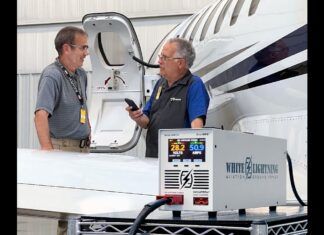Can You Believe This Guy?
In American business, Donald Trump is variously regarded as a helmet-haired blowhard or the most audacious businessman on the face of planet. But when it comes to audacity, compared to Christian Dries, the CEO of Diamond Industries, Trump is a painfully shy Girl Scout in a pink party dress. This is the only rational conclusion you can make after reading a recent press release explaining the

certification of the new Austro diesel engine under Dries guidance in Austria. In a crash 42-month program, Dries spent-according to the press release-the princely sum of $62 million (48 million Euro) to develop the Austro and set up a factory to produce it.
Lets run the playhead back to 2002, when Diamond announced its audacious plans to build a new twin in a market where twin values were practically in free fall. And, oh, by the way, it would have diesel engines which hadnt been certified yet. Fast forward to 2008: The Thielert engine economics made security-backed mortgages look like a lead-pipe cinch and by last spring, Thielert was in bankruptcy. That meant 500 or so Twin Stars were suddenly without a long-term viable engine. It also created a corps of angry customers.
Now you might say that any prudent businessman would cut his losses and maybe fish around for another line of work. Not Dries. In the Austro project, he has essentially gone double down. Heres a guy who feels hes been burned by Rotax and burned by Thielert and, by damn, hes had enough. Hes going to make his own engines.
To say this is a giant gamble is to give understatement a bad name. Thielert failed for various reasons that arent, in my view, entirely understood. Its possible that the fundamental economics were untenable or that converting automotive diesels just wont work. Or that the company was mismanaged. Or Thielerts troubles could have been some combination of all of the above, plus something else we don’t know about.
But never mind. Dries and company are forging ahead. And get this: Other diesel engine companies have been working projects as long or longer than Dries has and only one, SMA, has a handful of production airplanes flying. Dries has a fleet, has failed at it once and is still years ahead of everyone else. Of such stuff is real capitalism made.
I don’t know if the Austro will succeed or not. But I for one am on the sidelines cheering wildly that it does.(Im also fervently hoping nothing was overlooked in Austros compressed, breakneck testing program. Dries may not be up for the hat trick.) Diamond proved there’s demand for aerodiesels and that buyers want them. Now it gets a second chance to prove that companies making them can survive.
Oh,
That Decimal PointAshley Mullen of La Jolla, California, wrote to note that in our article in the February issue on ECI cylinder failures, the percentage of affected cylinders was misstated. Forty-five failures in 17,000 cylinders is 0.3 percent, not 0.003 percent, as Id stated. That one got by our crack statistical review board which is, unfortunately, staffed by liberal arts majors.
Further, writes Mullen, the article didnt note that its engine failures that matter, not necessarily cylinders, since every set of cylinders gives every engine four or six chances to fail. Good points, all. But Id argue that this doesnt change the conclusion. Shops still disagree on whether ECIs cylinder problem was and is large enough to require the continuing AD. In any case, the larger issue remains: Should you buy ECI cylinders or not? I still say the answer is yes.
-Paul Bertorelli

